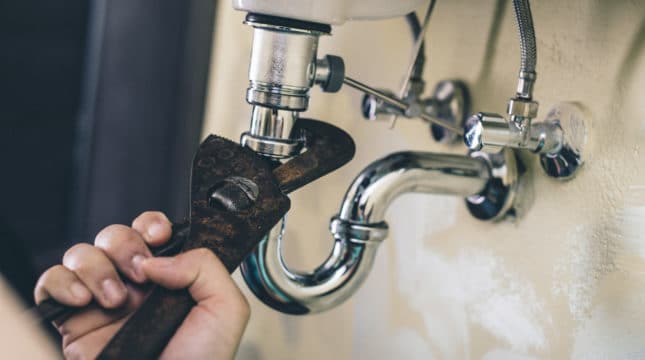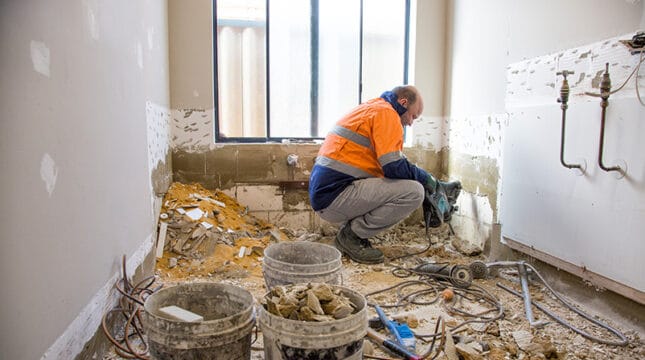Do you need a Tennessee plumbing license to work?
Tennessee law requires you to have a plumbing license for all plumbing work. However, unlike many states, they do not have journeyman plumber or master plumber state licensing.
If you plan to tackle smaller jobs — like fixing leaky pipes or installing water heaters — you’ll need the Limited Licensed Plumber (LLP) license. This covers you for projects up to $25,000, which handles most residential work and smaller commercial jobs.
For projects worth $25,000 or more, you’ll need a contractor’s license with a plumber classification (CMC or CMC-A).
But heads up: Some counties don’t accept the LLP license. You may also need additional licensing to work in Benton, Decatur, Dickson, Giles, Henderson, Henry, Hickman, Humphreys, Lake, Lawrence, Lewis, Obion, Perry, Stewart and Weakley counties.
Insurance requirements for a Tennessee plumbers license
Running a plumbing business in Tennessee without insurance is like working on pipes without a wrench — technically possible but risky. Let’s look at which plumber insurance types you need and which you should seriously consider.
Workers’ Compensation insurance
Tennessee law requires you to carry workers’ comp insurance if you have employees. It isn’t just a legal box to check. Workers’ comp helps protect both you and your team if someone gets hurt on the job, covering medical expenses and lost wages.
Learn more about workers’ compensation for contractors.
General Liability insurance
LLPs can work without it, but plumbing contractor licenses require general liability coverage.
The amount varies: you might need $100,000 for basic home repairs, but that jumps to $1 million or more for major commercial projects. Check the board’s insurance resource information for specific guidelines based on your work.
General liability coverage can help protect your business from third-party claims related to property damage or injuries that happen while you’re working. It can also help protect against personal and advertising injuries.
Commercial Property insurance
Your shop, warehouse, or office needs protection, too. Commercial property insurance helps cover your business space and everything in it – from stored materials to office equipment – against fire, theft and wind storms.
Business Owner’s Policy
A business owner’s policy, or BOP insurance, provides broad coverage of general liability and commercial property policies combined in a single, more cost-efficient bundle. That means it can help cover damage that you or your employees may inadvertently cause to another person’s property and help protect your business inventory in the event of a fire or other covered event.
Tools and Equipment insurance
Ever had a tool grow legs and walk away from a job site? Tools and equipment insurance helps cover your gear against theft, damage or loss. For plumbers, whose specialty tools can cost thousands, this coverage can mean the difference between a minor setback and a major financial hit.
Commercial Auto insurance
Commercial auto insurance helps protect your work vehicles and covers accidents that happen while you’re on the clock — something your personal insurance may not cover. In Tennessee, drivers must have these coverage minimums:
- $25,000 for each bodily injuries
- $50,000 for total injuries per accident.
- $25,000 for property damage per accident.
How to get a plumbing license in TN
Tennessee plumbing licenses aren’t one-size-fits-all. You have two options: a Limited Licensed Plumber (LLP) works for most residential jobs and smaller commercial projects up to $25,000.
For bigger projects or if you plan to work in certain counties that don’t accept the LLP, you should pursue a contractor’s license with a plumbing classification.
Let’s break down each path and review Tennessee plumbing license requirements.
Getting your Limited Licensed Plumber (LLP) license
An LLP license is your entry ticket to the plumbing world in Tennessee. Here are the must-have requirements:
- You’re at least 18 years old.
- You can legally work in the U.S.
- You’ve got a year of plumbing experience.
- You passed the plumber exam with a 73% or higher score.
If you’re looking for ways to gain experience, the Tennessee State Pipe Trades Association has apprenticeship programs. It isn’t required, but it’s a great option to learn the ropes.
The plumber exam has 40 questions; you’ll need to answer at least 29 correctly to pass the Tennessee plumbing license test with a 73%. The good news is that it’s open-book. PSI handles scheduling, and you’ll register for the exam directly through them.
Once you have the experience and passing exam score, you’ll complete the LLP application, pay your application fee and mail it to the Tennessee Board for Licensing Contractors who oversees this licensure.
Getting your contractor’s license with a plumbing classification (CMC or CMC-A)
You’ll need to jump through a few more hoops to get your contractor’s license, but in 15 Tennessee counties, it’s your only option. Benton, Decatur, Dickson, Giles, Henderson, Henry, Hickman, Humphreys, Lake, Lawrence, Lewis, Obion, Perry, Stewart, and Weakley counties may not accept an LLP license and may have local licenses.
To start, know that the state of Tennessee offers two paths: the CMC-A for plumbing or the CMC if you want to handle both mechanical and plumbing work.
Either way, you’ll fill out the Tennessee Plumbing Exam Pre-Approval Request form and prove you’ve got three years of experience to be eligible.
Next, you must pass both the business and law exam and your chosen plumbing exam (CMC-A or CMC) with a 73% or higher score. The business and law exam has 50 questions, while the CMC-A plumbing exam includes 110. If you’re taking the broader CMC exam, expect 120 questions.
PSI administers these tests, and they’re open-book, so use that to your advantage. You can find details about what’s covered and recommended study materials in PSI’s Candidate Information Bulletin.
When you’re ready to apply, head to the state’s Comprehensive Online Regulatory & Enforcement (CORE) System. It helps to gather the necessary documents before logging in. You’ll find the full list of forms in the Online Application Forms Resource, but here’s what you’ll need to get started:
- A financial statement prepared by a licensed CPA.
- Your proof of passing contractor exam scores.
- A certificate of general liability insurance.
If you’re running a corporation, limited liability company (LLC), or limited partnership, you’ll also need to provide your business registration documents from the Secretary of State’s office. And don’t forget to include a certificate of workers’ compensation insurance if you have employees working for you.
The board reviews the applications during their regular meetings, and you can look up your license status online within three to seven business days after they meet. Check the board’s meeting schedule when planning your timeline.
Tennessee plumbing license reciprocity
If you’re licensed as a plumber in Ohio, you’re in luck — Tennessee has a reciprocity agreement with the Buckeye State. But don’t pack your tools just yet.
The reciprocity doesn’t mean you can immediately begin working as a plumber in Tennessee. Instead, it gives you a trade exam waiver. This means you won’t need to take the plumbing-specific portion of the licensing exam, but you’ll still need to meet all other requirements.
TN plumbing license renewal requirements
Mark your calendar — your LLP or contractor’s license must be renewed every two years. There’s no grace period once your license expires, so renewing it about 30 days before it lapses is best.
You can renew online and pay the renewal fees if you have an LLP. Contractor license holders must also complete eight hours of continuing education, submit a fresh financial statement, and show proof of current Tennessee insurance coverage.





